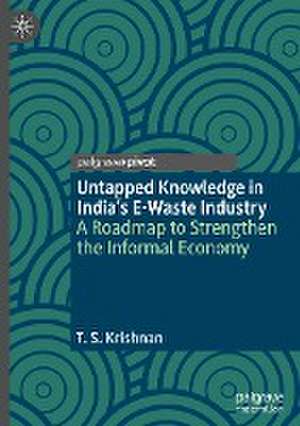Untapped Knowledge in India’s E-Waste Industry: A Roadmap to Strengthen the Informal Economy: Palgrave Advances in the Economics of Innovation and Technology
Autor T. S. Krishnanen Limba Engleză Hardback – 24 ian 2024
This vital resource explores the complexities of the e-waste industry, and it comprehensively explains the importance of developing context-specific solutions that leverage the inherent strengths of informal processors. The resulting resource offers a counterpoint to mainstream arguments that dismiss the value of expertise from informal processors.
Preț: 316.71 lei
Nou
Puncte Express: 475
Preț estimativ în valută:
60.60€ • 63.44$ • 50.14£
60.60€ • 63.44$ • 50.14£
Carte tipărită la comandă
Livrare economică 05-19 aprilie
Preluare comenzi: 021 569.72.76
Specificații
ISBN-13: 9783031502958
ISBN-10: 3031502957
Pagini: 103
Ilustrații: XIX, 103 p. 1 illus.
Dimensiuni: 148 x 210 mm
Greutate: 0.3 kg
Ediția:1st ed. 2023
Editura: Springer International Publishing
Colecția Palgrave Macmillan
Seria Palgrave Advances in the Economics of Innovation and Technology
Locul publicării:Cham, Switzerland
ISBN-10: 3031502957
Pagini: 103
Ilustrații: XIX, 103 p. 1 illus.
Dimensiuni: 148 x 210 mm
Greutate: 0.3 kg
Ediția:1st ed. 2023
Editura: Springer International Publishing
Colecția Palgrave Macmillan
Seria Palgrave Advances in the Economics of Innovation and Technology
Locul publicării:Cham, Switzerland
Cuprins
Chapter 1: Repositioning the “informal economy”: The hidden potential for a new circular economy in India’s electronic waste industry.- Chapter 2: “Business as Usual”: Systemic barriers to achieving sustainability in India’s e-waste processing industry.- Chapter 3: The power of markets: Economics of India’s e-waste processing industry.- Chapter 4: Specialized social networks with deep expertise: The value of cultural capital in India’s e-waste processing industry.- Chapter 5: Policy futures that leverage the strength of informal economy: Opportunities to advance circular economy and UN SDGs
Notă biografică
T. S. Krishnan is an independent scholar with expertise working across disciplines such as supply chain management, ethnography, and sustainability. He has served as a visiting faculty member at the Indian Institute of Management Nagpur and Ashoka University. Krishnan has worked in industries including sales enablement, data science, artificial intelligence, and product management. His research on informal economy, waste management, artificial intelligence, enterprise software, radiation epidemiology, and environmental sustainability has been published in international academic journals and conferences. He received his PhD from the Indian Institute of Management Bangalore.
Textul de pe ultima copertă
“Krishnan’s study of e-waste, its informal recycling and circular reprocessing—and the new policy to formalise it—provides granular evidence of unintended policy effects and the paradoxical waste of the very human and material resources that the policy seeks to develop. A must-read for wastistas and for policy scholars and practitioners.”
—Barbara Harriss-White, University of Oxford
“Krishnan’s research makes a compelling case for designing e-waste policies in collaboration with informal processors by recognizing and valuing their system.”
—Martha Alter Chen, WIEGO, Harvard University
This book focuses on the economic, political, and cultural factors that make up India’s “informal processors,” which are the highly networked, multi-generational systems that reuse, repurpose, and otherwise dispose of 80% of India’s electronic waste. The research includes insight from more than ninety interviews with forty-nine key stakeholdersworking within India’s e-waste processing industry. Throughout the book, T S Krishnan explores the complexities of the e-waste industry and comprehensively explains the importance of developing context-specific solutions that leverage the inherent strengths of informal processors. The resulting resource offers a counterpoint to mainstream arguments that dismiss the value of expertise from informal processors.
T S Krishnan is an independent scholar with expertise working across disciplines such as supply chain management, ethnography, and sustainability. He has served as a visiting faculty member at the Indian Institute of Management Nagpur and Ashoka University. Krishnan has worked in industries including sales enablement, data science, artificial intelligence, and product management. He received his PhD from the Indian Institute of Management Bangalore.
—Barbara Harriss-White, University of Oxford
“Krishnan’s research makes a compelling case for designing e-waste policies in collaboration with informal processors by recognizing and valuing their system.”
—Martha Alter Chen, WIEGO, Harvard University
This book focuses on the economic, political, and cultural factors that make up India’s “informal processors,” which are the highly networked, multi-generational systems that reuse, repurpose, and otherwise dispose of 80% of India’s electronic waste. The research includes insight from more than ninety interviews with forty-nine key stakeholdersworking within India’s e-waste processing industry. Throughout the book, T S Krishnan explores the complexities of the e-waste industry and comprehensively explains the importance of developing context-specific solutions that leverage the inherent strengths of informal processors. The resulting resource offers a counterpoint to mainstream arguments that dismiss the value of expertise from informal processors.
T S Krishnan is an independent scholar with expertise working across disciplines such as supply chain management, ethnography, and sustainability. He has served as a visiting faculty member at the Indian Institute of Management Nagpur and Ashoka University. Krishnan has worked in industries including sales enablement, data science, artificial intelligence, and product management. He received his PhD from the Indian Institute of Management Bangalore.
Caracteristici
Explores the economic, political, and cultural significance of India's e-waste processing industry Includes policy recommendations that are cost effective and ensure minimal disruption Provides a new policy framework to help industries transition into the circular economy






